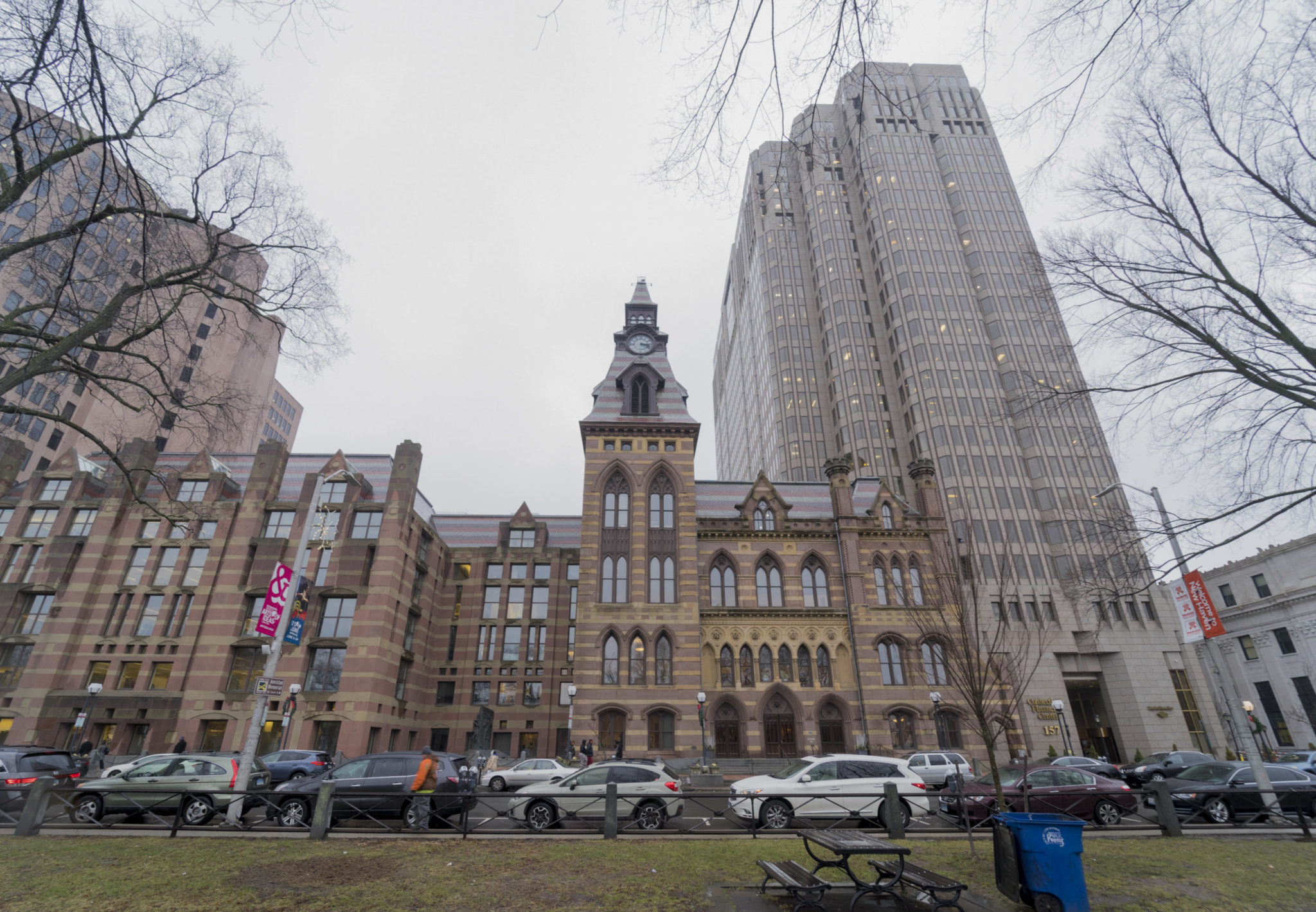Victory lap on electric bus celebrates new Infrastructure Investment and Jobs Act
On Monday afternoon, city politicians celebrated the enactment of the Infrastructure Investment and Jobs Act, culminating their speeches in a victory lap on an electric bus.

Yale Daily News
For the city leaders and residents gathered at State Street’s Connecticut Transit garage this Monday afternoon, their bus ride was more than a free pass to explore parts of Hamden; it was a victory lap celebrating the recent enactment of the Infrastructure Investment and Jobs Act.
That vehicle is the first of 739 more electric buses to come in the Connecticut public transportation system; presenting a more energy-efficient alternative to traditionally diesel-powered buses, these buses are just one part of what the new act hopes to achieve. U.S. Rep. Rosa DeLauro, who represents New Haven and is also the chair of the House Appropriations Committee, got approval for $5.38 billion to be invested in Connecticut infrastructure over the next five years, after years of spearheading the initiative. In a press conference that preceded the bus ride, politicians noted that about $1.3 billion of that sum will be dedicated to the Connecticut Transit System. DeLauro said that the act is the second largest infrastructure-related project in the state — after the implementation of the Interstate Highway System. It oversees funding for many sectors, including trade, bicycle and pedestrian routes and technology.
“I’ve always viewed infrastructure as an economic driver —- as what can help transform our cities, our state and our nation by creating more jobs and economic growth,” DeLauro said.
The act represents a turnaround from the damage that Connecticut suffered over the COVID-19 pandemic, DeLauro explained. According to DeLauro, in addition to international economic hurdles and social distancing restrictions during the pandemic, many people in the transportation industry faced unemployment due to significantly less ridership. The Connecticut Transit System itself, which offers 22 local routes, experienced a 90 percent decrease in ridership when the virus hit the hardest, for example, DeLauro said.
Despite this, Garrett Eucalitto, Connecticut Department of Transportation’s deputy commissioner, spoke to the resilience of the unsung “heroes” that are transportation and infrastructure workers, who continue to provide service nearly every day and during holidays. DeLauro hopes that the new legislation will spur more jobs that cannot be outsourced and help these workers and their families regain their financial standing. Ralph Buccitti, Transit Union chairman of the Connecticut Joint Bargaining Council, added that payment is not the only factor that needs to be considered in successful employment; a weekly 40-hour work schedule is just as critical, and the bill can potentially help address this by providing funding for a program that trains people in human resources and maintaining full-time jobs.
To DeLauro, the bill is as much a victory for everyday residents as it is for the city’s economy, however. She mentioned that people depend on public transportation, infrastructure and technology to not only make a living, but also to reconnect with their loved ones and friends — opportunities that were lost during the pandemic. Sen. Jorge Carbrera shared a personal experience growing up riding public transportation, stating that traveling kept him “busy” and “out of trouble” during a time of life when finding direction was a priority.
“The investment in broadband is going to dramatically improve access to high speed internet,” said New Haven Mayor Justin Elicker. It is “going to help our young people access school in better ways and … help promote more flexibility.”
Hamden Mayor Lauren Garrett agreed, emphasizing that two other important aspects of the act are commitments to equity and environmental sustainability. The equity part is not just about ensuring city-wide employment — DeLauro explained that marginalized communities of color disproportionately rely on public transportation and have been particularly at a disadvantage during the pandemic. As for promoting more eco-friendly approaches to infrastructure and economic development, Garrett noted that funding from the act will be used to invest in options that divest from fossil fuel alternatives, such as electric buses. Doing so not only promotes support for climate change at a global level, but also improves local air quality and ensures that people are not suffering health consequences while working and traveling, Garrett said.
Though a milestone in Connecticut history, enacting the bill is just the beginning in a journey to keep “lobby[ing] and negotiat[ing],” to rebuild a pre-pandemic city, Buccitti said. Elicker and Garrett have already been in conversation about future collaborations between the two cities to further improve Connecticut’s transit system, and the funding overseen by the bill also presents opportunities to collaborate with other humanitarian programs in childcare and education.
“We’re going to see the impact and effect of the [bill] for generations to come,” Cabrera said.
The Infrastructure Investment and Jobs Act surpassed the 2015 transportation bill by $1.63 billion in funding.







